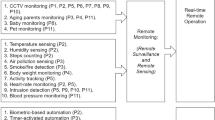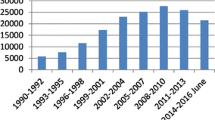Abstract
Ambient Intelligence provides the potential for vast and varied applications, bringing with it both promise and peril. The development of Ambient Intelligence applications poses a number of ethical and legal concerns. Mobile devices are increasingly evolving into tools to orientate in and interact with the environment, thus introducing a user-centric approach to Ambient Intelligence. The MINAmI (Micro-Nano integrated platform for transverse Ambient Intelligence applications) FP6 research project aims at creating core technologies for mobile device based Ambient Intelligence services. In this paper we assess five scenarios that demonstrate forthcoming MINAmI-based applications focusing on healthcare, assistive technology, homecare, and everyday life in general. A legal and ethical analysis of the scenarios is conducted, which reveals various conflicting interests. The paper concludes with some thoughts on drafting ethical guidelines for Ambient Intelligence applications.

Similar content being viewed by others
Notes
The MINAmI Ethical Advisory Board includes external experts of different fields of ethics. It identifies and evaluates broader ethical implications related to the project vision, goal, and products.
Directive 2000/31/EC of the European Parliament and of the Council of 8 June 2000 on certain legal aspects of information society services, in particular electronic commerce, in the Internal Market (Directive on electronic commerce), L 171, 17.07.2000, p. 1-16.
Directive 95/46/EC of the European Parliament and of the Council of 24 October 1995 on the protection of individuals with regard to the processing of personal data and on the free movement of such data, L 281, 23.11.1995, p. 31-50 (Data Protection Directive).
The “Sleep quality logger” is delivered to the patient with fully charged batteries and it will power on automatically when the measurement is initiated. There is no need to switch the device off, but the batteries will become empty eventually. Data read-out clears the memory of the device, while recharging the batteries takes the device into stand-by mode.
Volkszählungs-Urteil, BVerfGE 65,1-Volkszählung.
References
Airaksinen, T. (2003). Tekniikan suuret kertomukset. Otava, Helsinki.
Article 29 Data Protection Working Party (2007). Opinion on the processing of personal data relating to health in electronic health records (EHR), WP 131.
Bohn, J., Coroamă, V., Langheinrich, M., Mattern, F., & Rohs, M. (2005). Social, economic, and ethical implications of ambient intelligence and ubiquitous computing. In W. Weber, J. M. Rabaey, & E. Aarts (Eds.), Ambient intelligence (pp. 5–29). Berlin/Heidelberg: Springer.
Buchta, A., Dumortier, J., & Krasemann, H. (2005). Subchapter 5.1: The legal and regulatory framework for PRIME. In S. Fischer-Hübner & Ch. Andersson (Eds.), D14.0.a: Framework V0, PRIME (Privacy and Identity Management for Europe) Project (pp. 49–60). http://www.prime-project.eu/prime_products/reports/fmwk/pub_del_D14.0.a_ec_wp14.0_V6_final.pdf. Accessed May 10 2008.
Carrol, J. M. (1995). Scenario-based design: Envisioning work and technology in system development. New York: Wiley.
Dumortier, J., & Goemans, C. (2004). Privacy protection and identity management. In B. Blažič & W. Schneider (Eds.), Security and privacy in advanced networking technologies (pp. 191–212). IOS Press: NATO Science Series.
Duquenoy, P. (2007a). Ethics in the environment of the information society. The European regional conference on the “Ethical dimensions of the information society: Ethics and human rights in the information society”, organised by the French Commission for UNESCO in cooperation with UNESCO and the Council of Europe. Strasbourg, France, 13-14.09.2007. http://portal.unesco.org/ci/en/files/25453/11909027561Duquenoy-Penny.pdf/Duquenoy-Penny.pdf. Accessed December 15 2008.
Duquenoy, P. (2007b). Identifying ethical issues in Ami environments. In Usages and acceptance of mobile Ami—MINAmI workshop. Sophia-Antipolis, France, 19.09.2007. Presentation slides: http://www.fp6-minami.org/fileadmin/user/telechargements/WS/MINamI_sept_07Duquenoy.pdf. Accessed December 15 2008.
Harris, I., Jennings, R., Pullinger, D., Rogerson, S., & Duquenoy, P. (2008, September). Helping ICT professionals to assess ethical issues in new and emerging technologies. In MINAmI workshop on ambient intelligence and ethics. University of Pavia, Mantua, Italy. http://www.fp6-minami.org/. Accessed December 15 2008.
Ikonen, V., Kaasinen, E., Niemelä, M., & Leikas, J. (2008). Ethical guidelines for mobile-centric ambient intelligence. http://www.fp6-minami.org/uploads/media/MINAmI_EthicalGuidelinesforAmI_v12.pdf. Accessed December 15 2008.
Introna, L. D. (2007). Maintaining the reversibility of foldings: Making the ethics (politics) of information technology visible. Ethics and Information Technology, 9(1), 11–25.
Kaasinen, E., Ermolov, V., Niemelä, M., Tuomisto, T., & Välkkynen, P. (2006a). Identifying user requirements for a mobile terminal centric ubiquitous computing architecture. In FUMCA 2006: System support for future mobile computing applications. Workshop at Ubicomp 2006. http://ieeexplore.ieee.org/stamp/stamp.jsp?arnumber=04021039. Accessed May 07 2008.
Kaasinen, E., Niemelä, M., Tuomisto, T., Välkkynen, P., & Ermolov, V. (2006b). Identifying user requirements for a mobile terminal centric ubiquitous computing architecture. In Proceedings of international workshop on system support for future mobile computing applications (FUMCA’06). doi:10.1109/FUMCA.2006.6.
Kosta, E., & Dumortier, J. (2008). Searching the man behind the tag: Privacy implications of RFID technology. International Journal of Intellectual Property Management (IJIPM), 2(3), 276–288.
Kosta, E., Pitkänen, O., Niemelä, M., & Kaasinen, E. (2008). Ethical-legal challenges in user-centric AmI services. In Proceedings of internet and web applications and services, 2008, ICIW ’08. doi:10.1109/ICIW.2008.81.
Lorenzo, J., & Antolin, P. (2006). MINAmI usage scenarios. Part I, Demonstrator scenarios. MINAmI Project deliverable D1.1.
Niemelä, M. (2006, September 20–22). MIMOSA/MINAmI: Building mobile-centric ambient intelligence. In AmI.d conference, Sophia Antipolis.
Niiniluoto, I. (1991). What’s wrong with relativism? Science Studies, 4(2), 17–24.
Niiniluoto, I. (1994). Järki, arvot ja välineet. Otava, Helsinki.
Pietarinen, J. (1994). Itsemäärääminen ja itsemääräämisoikeus. In J. Pietarinen, et al. (Eds.), Oikeus itsemääräämiseen. Helsinki: Painatuskeskus.
Pitkänen, O., Virtanen, P., & Kemppinen, J. (2008). Legal research topics in user-centric services. IBM Systems Journal, 47(1), 143–152.
Quirchmayr, G., & Wills, C. C. (2007). Data protection and privacy laws in the light of RFID and emerging technologies. In C. Lambrinoudakis, G. Pernul, & A. M. Tjoa (Eds.), TrustBus 2007, LNCS 4657 (pp. 155–164)). Berlin/Heidelberg: Springer.
Rotter, P. (2008). A framework for assessing RFID system security and privacy risks. IEEE Pervasive Computing, 7(2), 70–77.
van den Hoven, J. (2007). ICT and value sensitive design. In P. Goujon, S. Lavelle, P. Duquenoy, K. Kimppa, & V. Laurent (Eds.), The information society: Innovations, legitimacy, ethics and democracy (pp. 67–72). Boston: Springer.
Wasieleski, D. M., & Gal-Or, M. (2008). An enquiry into the ethical efficacy of the use of radio frequency identification technology. Ethics and Information Technology, 10(1), 27–40.
Acknowledgments
This work was supported in part by the MINAmI project, which receives research funding from the European Union’s Sixth Framework Programme; however, the paper represents the views of the authors only.
Author information
Authors and Affiliations
Corresponding author
Additional information
This is an updated and enriched version of the paper “Ethical-Legal Challenges in User-Centric AmI Services”, presented at ICIW/SLAECE 2008.
Rights and permissions
About this article
Cite this article
Kosta, E., Pitkänen, O., Niemelä, M. et al. Mobile-Centric Ambient Intelligence in Health- and Homecare—Anticipating Ethical and Legal Challenges. Sci Eng Ethics 16, 303–323 (2010). https://doi.org/10.1007/s11948-009-9150-5
Received:
Accepted:
Published:
Issue Date:
DOI: https://doi.org/10.1007/s11948-009-9150-5




